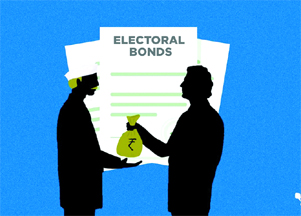New Delhi (TIP)- In what is being considered a landmark judgement, the Supreme Court on Thursday, 15 February, struck down the much-touted electoral bonds scheme, stating that it was “unconstitutional.” In the six years of the scheme, which came into existence in January 2018, a total of over Rs 16,518 crore was reportedly collected by all the political parties, as per a report by the Delhi-based non-profit Association for Democratic Reforms (ADR), one of the petitioners in the case.
However, all the political parties together received nearly than Rs 12,000 crore. To be precise, the actual number is Rs 11,986.66 crore.
Explaining the existing gap of over Rs 4,500 crore, ADR Programme and Research Coordinator Shelly Mahajan told South First, “The Rs 16,518 crore amount is the total amount of electoral bonds that have been purchased by the donors till January this year. But, the audit reports submitted by the political parties are till the last fiscal year (FY 2022-23). Once, the audit reports for the FY 2023-24 are submitted, this gap will be covered as well.”
About the data published by the ADR on their website, she said, “The data has been compiled based on the RTIs filed by us to the State Bank of India (SBI), the regulatory authority to issue the electoral bonds. It has also been obtained by other transparency activists with whom we consulted.”
The ruling Bhartiya Janta Party (BJP) stands at the top, having received 54.77 percent (Rs 6,565.975 crore) of the total political donations from FY 2017-18 to FY2022-23. That’s well more than half the entire donated amount in the given period.
In comparison, the Indian National Congress (INC), the other national political party and the primary Opposition at the Centre, was able to secure a meagre 9.37 percent (Rs 1,123.29) of the cumulative amount — around one-sixth of what the BJP got.
Starting in 2018, after the Prime Minister Narendra Modi-led Union government released a notification, the electoral bond was treated like a promissory note. It was a bearer instrument payable to the bearer on demand.
Unlike a promissory note, which contains the details of the payer and payee, an electoral bond had no information on the parties in the transaction at all, providing complete anonymity and confidentiality to the parties. Over the years, the bonds faced criticism from the Opposition parties over a lack of transparency. As for the contributions, the BJP bagged nearly Rs 1,300 crore through electoral bonds in the fiscal year 2022-23. This amounted to seven times more than what the Congress got in the same period.
In the 2022-23 fiscal, the Congress received donations of Rs 171 crore from electoral bonds, a drop of Rs 65 crore from the 2021-22 FY, when it got Rs 236 crore.
In the same FY, the BJP amassed a capital of worth Rs 1775 crore — a significant share of which came from the electoral bonds, Rs 1,033 crore.
This means that BJP secured Rs 797 crore more than the Congress in FY 2021-22, just when the world started to recover from the Covid-19 pandemic.
Source: The South First
55% of electoral bond donations went to BJP: Data
